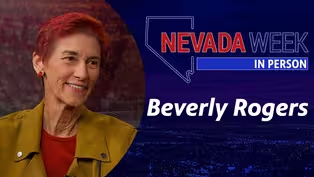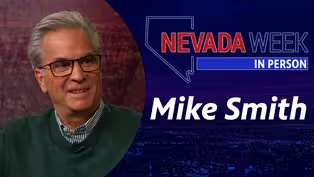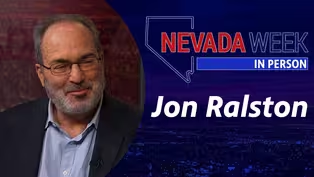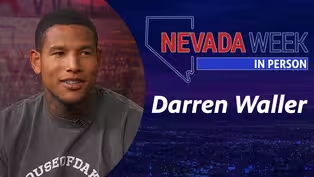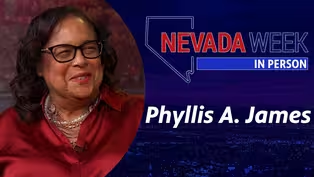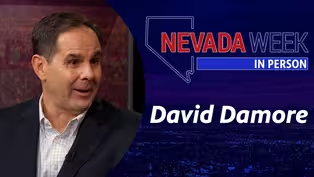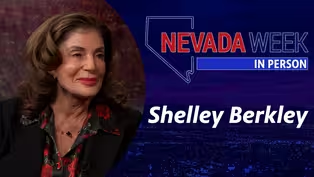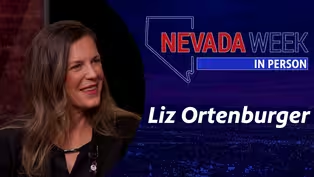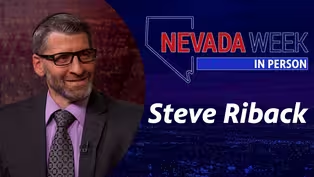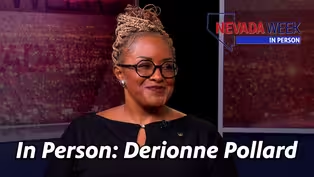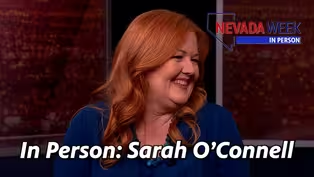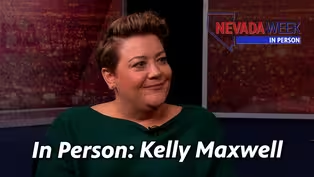
Nevada Week In Person | Michael Lyle
Season 1 Episode 36 | 14mVideo has Closed Captions
One-on-one interview with Nevada Current reporter Michael Lyle.
One-on-one interview with Nevada Current reporter Michael Lyle.
Problems playing video? | Closed Captioning Feedback
Problems playing video? | Closed Captioning Feedback
Nevada Week In Person is a local public television program presented by Vegas PBS

Nevada Week In Person | Michael Lyle
Season 1 Episode 36 | 14mVideo has Closed Captions
One-on-one interview with Nevada Current reporter Michael Lyle.
Problems playing video? | Closed Captioning Feedback
How to Watch Nevada Week In Person
Nevada Week In Person is available to stream on pbs.org and the free PBS App, available on iPhone, Apple TV, Android TV, Android smartphones, Amazon Fire TV, Amazon Fire Tablet, Roku, Samsung Smart TV, and Vizio.
Providing Support for PBS.org
Learn Moreabout PBS online sponsorshipMore from This Collection
Nevada Week In Person goes beyond the roundtable discussion of Nevada Week with guests for a more casual conversation about their personal passions, new projects and compelling stories that are overlooked in the flurry of the news cycle.
Nevada Week In Person | Beverly Rogers
Video has Closed Captions
One-on-one interview with Rogers Foundation chair Beverly Rogers. (14m)
Nevada Week In Person | Mike Smith
Video has Closed Captions
One-on-one interview with Las Vegas Sun political cartoonist Mike Smith. (14m)
Nevada Week In Person | Jon Ralston
Video has Closed Captions
One-on-one interview with The Nevada Independent CEO Jon Ralston. (14m)
Nevada Week In Person | Darren Waller
Video has Closed Captions
One-on-one interview with Las Vegas Raider tight end Darren Waller. (14m)
Nevada Week In Person | Phyllis A. James
Video has Closed Captions
One-on-one interview Phyllis A. James. (14m)
Nevada Week In Person | David Damore
Video has Closed Captions
One-on-one interview with Chair of the Department of Political Science at UNLV David Damor (14m)
Nevada Week In Person | Shelley Berkley
Video has Closed Captions
One-on-one interview Senior Vice President for Touro University Shelley Berkley. (14m)
Nevada Week In Person | Liz Ortenburger
Video has Closed Captions
One-on-one interview with SafeNest CEO Liz Ortenburger. (14m)
Nevada Week In Person | Steve Riback
Video has Closed Captions
One-on-one interview with Las Vegas Metro Police Lieutenant Steve Riback. (14m)
Nevada Week In Person | DeRionne Pollard
Video has Closed Captions
One-on-one interview Nevada State College President DeRionne Pollard. (14m)
Nevada Week In Person | Sarah O’Connell
Video has Closed Captions
One-on-one interview with Director of Eat More Art LLC Sarah O’Connell. (14m)
Nevada Week In Person | Kelly Maxwell
Video has Closed Captions
One-on-one interview with Baby’s Bounty Executive Director Kelly Maxwell. (14m)
Providing Support for PBS.org
Learn Moreabout PBS online sponsorship-A journalist in Las Vegas for more than a decade with bylines from The Washington Post to Desert Companion and VEGAS INC , the Nevada Current 's Michael Lyle joins us this week for Nevada Week In Person.
♪♪♪ Support for Nevada Week In Person is provided by Senator William H. Hernstadt and additional supporting sponsors.
-Welcome to Nevada Week In Person.
I'm Amber Renee Dixon.
Born and, quote, mostly raised, unquote, in Las Vegas, the Nevada Press Association named him its Journalist of Merit in 2011.
Covering criminal justice to homelessness, race relations, and LGBTQ issues are what drive him.
Michael Lyle, thank you for joining us for Nevada Week In Person.
(Michael Lyle) Thank you for having me.
-So the Nevada Current 's website is where I read your bio, that you were born and mostly raised in Las Vegas.
Where else has life taken you, and what for?
-Yes.
So when my parents separated, I moved to Seattle, Washington for a year, and then Knoxville, Tennessee is where I went to high school.
Tennessee is where my family is-- or my mom's family is from.
And so moved back to be closer to them.
But I wanted to get away and came back here for college.
And I've been back out in Las Vegas since 2003.
-So after graduating from UNLV, which we will talk about, you went on to work for Not For Sale.
It's a nonprofit that combats sex trafficking, exploitation, and forced labor.
What was your takeaway from that experience?
-It was a very eye opening experience.
So the role was a volunteer position, but it was very eye opening.
And we did-- We organised a lot of events to raise awareness about human trafficking, not just on an international level, but locally on what's happening here in our backyards, in our streets.
I will say it was an eye opening experience, and I learned a lot of lessons, especially about organizing around a topic and around social justice issues.
But a lot of my views have actually changed a little bit since then.
I will say that Not For Sale is a good organization.
A lot of our work was anti-sex work.
I'm definitely in a different position.
I feel just interviewing sex workers, reading more research about it, I wish in my early 20s, when I was working there, I had a little bit more understanding about sex work and why it should be legalized and why we actually should support it and why there needs to be more nuanced reporting and conversations around the sex work industry.
-And I'm sure that's something that you learned from your reporting here in Las Vegas.
-Absolutely.
I mean, I cover a lot of homelessness, but overarching issues of poverty and just policy failures that lead to poverty.
And some of those same policy failures actually lead to human trafficking.
When you open up the doors for people to take jobs that might seem risky because they're desperate for money, that's when human trafficking happens.
And when they don't have the support to get housing or adequate wages, they might take jobs and positions that just put them in vulnerable positions.
And so I've learned a lot in how to enter-- how these topics are interconnected.
-You began working at the Las Vegas Review Journal .
For seven years you were there.
And your start there was in community reporting.
What is community reporting, and how did that impact the journalist you have gone on to become?
-So I was covering the City of Henderson, specifically, and just really diving deep into not just Henderson government, but Henderson stories, of Henderson businesses and events and people, and just kind of getting to connect with people.
It's essentially like a feature writer's position, but you get to dive into a community center.
And that helps build me up to interview people and be more personable with people and just seeing the very hyperlocal impact of policy decisions, of just everyday life of what it means to these people, and I take those-- that experience with me to covering statewide issues and more broader topics within policy and politics.
-I think it's reflected in your work, because you do cover issues that impact the regular person, average person.
For example, your most recent reporting on minimum wage in Nevada.
Where is it now?
So we just had a slight increase.
We're just at $10 an hour.
We're going to be getting to 12 by 2024 slowly, which is still not pretty high.
I mean, if you look at reporting-- If you look at national statistics, you need to make about $18 an hour to afford at least a one-bedroom here in Southern Nevada.
And so that's very, very striking difference.
But I feel like we talk about this in these-- in the terms of, of just dollar amounts without diving into who the people are.
These are people that are making our economy work.
These are our neighbors.
These are people that can't afford housing.
And so I think it's important to hear their stories about what it takes for them to actually survive on those wages and not kind of disconnect the number $10 an hour with the person that actually is earning it.
-As I mentioned in the introduction, you gravitate to stories about race relations and LGBTQ issues.
Why is that?
-Well, I am gay; and I'm also black, biracial black, and both important aspects of my identity.
And I feel aspects that are underreported sometimes, especially in subtopics when we talk about housing policy, when we talk about homeless policy, when you talk about education disparities.
There are racial disparities within each of those issues.
And so sometimes those topics don't really dive into the racial disparities.
And so I feel it's important for me to, for it to highlight and to look to those.
I think it's important being a gay reporter right now as you see a rise of anti-LGBTQ rhetoric and legislation sweep across the country.
Thankfully in Nevada, we have a lot more protections here.
But the animosity that we've seen towards the LGBTQ community is having a psychological effect on the community.
And so being gay myself, I'm able to actually talk with, with other people in the community and do an assessment and tell their stories, because it's important.
I feel like storytelling bridges such a huge gap.
And the reason why we're seeing some of these anti-LGBTQ bills happening is because people don't know any gay or trans people.
And so journalism gives that a door for some people that just don't have any idea what's going on to the community to see that we're just everyday people just trying to live our lives.
-They're able to get educated about reporting.
-Absolutely.
-Okay.
So journalism school at UNLV, but you are currently going to Syracuse online?
-I am.
I'm doing my master's in communication with an emphasis in journalism innovation.
So I graduated in 2008 from UNLV with emphasis in print journalism, and I love writing.
I will always be a writer.
But as you know, journalism is evolving.
There's different forms of journalism, whether it's podcasting, video journalism, documentaries.
There is just a different aspects and avenues to tell stories.
And so I love storytelling, and so I just wanted to explore different ways to tell stories.
And so I started to pursue my master's to expand my knowledge on it.
I had to take some breaks in my education, which is fine.
Things happen, but I'm back into it and, hopefully, will graduate with my master's this year.
-Very cool.
When we are in journalism school, we are taught to be aware of our own personal biases and try to keep them out of our reporting, show both sides of an issue and give equal time, equal coverage to both sides.
How do you go about preventing your personal biases from seeping into your reporting?
-That's an interesting question that we're having.
I think that we've always had in journalism about how we deal with bias.
But the truth is, everyone has bias.
Not only a gay black reporter does have bias in reporting, so does a white straight reporter.
But the problem I think in journalism sometimes is it's on the onus of marginalized communities to better explore and explain their bias in reporting and not on maybe a straight white male covering the same topic.
Of course, I have to acknowledge my bias going into stories, but I feel that you can stand up for human rights issues, acknowledge who you are and who your identity is, and still ask compelling questions and investigate stories and submit great articles that reflect, accurately reflect what's going on in the community.
-How unbiased do you think the media currently is?
-That's a hard question.
-Oh, it is.
It is.
I know.
-I think we are so concerned about the-- about the illusion of bias that we are sitting on the sidelines.
One of the biggest criticisms of covering the civil rights era is that journalists act as stenographers.
We just kind of set back.
We just want to tell both sides of the stories, but some stories you can't both sides.
You can't put both side's human rights issues and abuses.
You can't both sides when democracy is at stake.
We're seeing a rise in election deniers and people running for office with conspiracy theories, that are running on conspiracy theories.
And I feel we have to have a better conversation in this industry of how to accurately confront those stories, both human rights issues of democracy and be comfortable knowing that we're not going to appease everyone.
And people are going to call us bias, but it's our job to not sometimes sit on the sidelines.
-Media does receive a lot of criticism these days, and I'm not sure if the average person out there might know that a lot of hate can be directed individually at reporters.
You know, you'll see the reporter's email, and people often click on that and give them a piece of their mind.
How much of that have you faced?
-Oh, I get a fair share of emails and of messages, direct messages on social media sites to you.
I think probably not as much as other reporters.
I feel that especially women in this industry are targeted in a way that is just plain scary.
It is-- I've got easy-- it's easier for me to, I guess, brush off some of the comments.
But it is getting a little bit scarier.
I don't know, there was a documentary on HBO that looked at the rise of threats against journalism across the globe, and we're seeing that animosity towards media just growing.
And so it is definitely getting scary, but some of the emails I can just brush off and just say, hey, it's just one comment.
I can go forward.
Your Twitter profile, speaking about social media, you do put in your description that you are a gay, black Christian lover, or Christ lover.
You could very well choose not to put that on there.
Why do you choose to?
-I want to be forward, upfront about who I am.
We're going back to the question about bias.
Every reporter has bias.
Every reporter has an identity that they're bringing into their interviews, they're bringing it into their articles.
And so you're getting me who I am upfront.
You're not getting that with every reporter.
You're not-- You don't know their background; you don't know who they are.
And so you get that up front and who I am.
I'm not hiding anything from you.
-Has anyone said maybe you shouldn't do that?
-Not my editor, at least.
-And that's all that matters, right?
-That's all that matters.
-You certainly have your finger on the pulse of Nevada and Nevadans.
What are the biggest issues you're covering that you think the people in power need to take quick action on?
-I mean, we are taking action on the housing crisis.
But the housing crisis was happening before 2022.
It was happening before the pandemic.
And I feel like I was ringing the alarm back then.
And a lot of reporters ringing the alarm back then, and it didn't get-- I don't think it got the attention that it needed to get.
I think more outlets need to be covering the housing crisis.
But that is the foundation on so many things: educational achievements, success in your career.
Housing is such the root cause of this, and so I feel that is a huge issue that needs to be reported on and something that policymakers really need to take note on and just how consequential housing is.
-You have recent reporting on the average worker in Nevada, what they're able to afford.
What is that?
-So UNLV did a study about the top occupations in Nevada, and they found that 7 out of 10 occupations in Southern Nevada and 6 out of 10 of the top in Northern Nevada could not afford a studio apartment at least, couldn't afford rent.
That's so jarring to me that the people, our neighbors, the people making the city run, just can't make enough to afford a one-bedroom apartment.
And so it's coming out of their food costs, coming out of-- They have to choose between housing and prescription costs.
They have to make these decisions that I can't imagine.
I mean, my family has had to make these decisions, but it's just the way that they're having to make them now is just, it's scary and it's sad.
-Michael Lyle, we appreciate your time.
You can read his work on Nevada Current .
Thank you for coming in.
And thank you for joining us for Nevada Week In Person.
To see this week's edition of Nevada Week, tune in Sunday night at 5:30, Tuesday night at 7:30, or anytime you wish at vegaspbs.org/nevadaweek.
That is also where you can find this interview and many more.

- News and Public Affairs

Top journalists deliver compelling original analysis of the hour's headlines.

- News and Public Affairs

FRONTLINE is investigative journalism that questions, explains and changes our world.












Support for PBS provided by:
Nevada Week In Person is a local public television program presented by Vegas PBS
